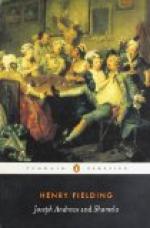|
This section contains 6,339 words (approx. 22 pages at 300 words per page) |

|
SOURCE: "Joseph Andrews and the Failure of Authority," in Critical Essays on Henry Fielding, edited by Albert J. Rivero, G.K. Hall & Co., 1998, pp. 69-82. Originally published in Eighteenth-Century Fiction, Vol. 4, 1992, pp. 109-24.
In the following essay, originally published in 1992 and reprinted in 1998, Knight examines Fielding's narrative style in Joseph Andrews, arguing that the text's heterogeneous construction emphasizes the mutual relationship between author and reader made possible by the emerging genre of the novel.
The garrulous narrator of Joseph Andrews and his complex novel have been interpreted in terms of implicitly conflicting analogies describable alternatively as religious and political. According to the first, the apparent authority of the narrator stands for the authority of God, especially the Christian and incarnate God who acts in history. 1 The function of Fielding's fictions is thus to reinforce, by their comic conclusion, the reader's confidence in a universe controlled by a benevolent...
|
This section contains 6,339 words (approx. 22 pages at 300 words per page) |

|


